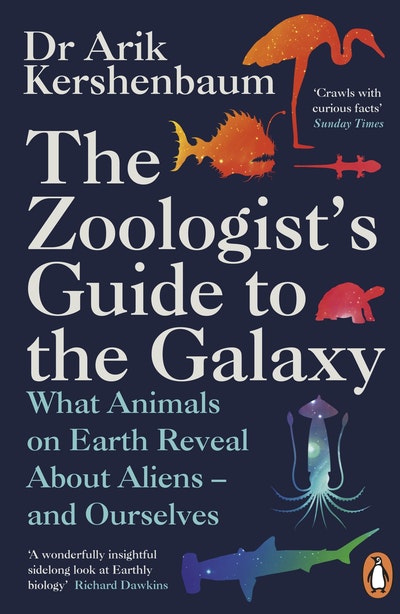- Published: 1 October 2021
- ISBN: 9780241986844
- Imprint: Penguin General UK
- Format: Paperback
- Pages: 368
- RRP: $22.99
The Zoologist's Guide to the Galaxy
What Animals on Earth Reveal about Aliens – and Ourselves
- Published: 1 October 2021
- ISBN: 9780241986844
- Imprint: Penguin General UK
- Format: Paperback
- Pages: 368
- RRP: $22.99
A fun, and thoroughly biological, exploration of possible and impossible alien beings. If you'd love to know what real aliens from other planets might really be like, this is the book for you
Susan Blackmore, author of Seeing Myself
If you don't want to be surprised by extraterrestrial life, look no further than this lively overview of the laws of evolution that have produced life on earth.
Frans de Waal, author of Mama’s Last Hug
Evolutionary theory helps us explain patterns in the past, and combined with a rich understanding of natural history and biodiversity, predict what might be discovered in the future. Arik Kershenbaum takes us on a joyous voyage of animal diversity and illustrates the singular importance of natural selection in explaining life - here on Earth - and what will likely be discovered throughout the galaxy. A stimulating read!
Daniel T. Blumstein, Professor of Ecology and Evolutionary Biology, University of California Los Angeles
Surveying the deep-time of evolution on Earth and his own cutting-edge research into animal communication, Kershenbaum provides a fascinating insight into the deepest of questions: what might an alien actually look like
Lewis Dartnell, author of Origins
When we search for aliens, what are we searching for? If life exists on other worlds, it might look very different to life 'as we know it', but Arik Kershenbaum makes a persuasive and entertaining case that we needn't be completely in the dark. There are some rules that all beings with a claim to be alive must observe, and for which life on our planet can serve as a guide. This is an eye-opening and, above all, a hopeful view of what - or who - might be out there in the cosmos
Philip Ball, author of Nature's Patterns
The book crawls with curious facts . . . [Kershenbaum] is fascinating on how aliens might communicate
James McConnachie, The Sunday Times
This is no mere frivolous exercise in arm-waving (or tentacle-waving) and baseless speculation. Instead, what emerges is a fascinating plunge into the deep-time history of life on Earth and animal evolution in all its glorious diversity . . . To comprehend the alien is to know thyself
Lewis Dartnell, The Times
I love The Zoologist's Guide to the Galaxy by Arik Kershenbaum. Although it sets out to be (and is) about alien life, what emerges is a wonderfully insightful sidelong look at Earthly biology
Richard Dawkins, via Twitter
A wonderful mix of science-based speculation and entertaining whimsy
David P. Barash, Wall Street Journal



